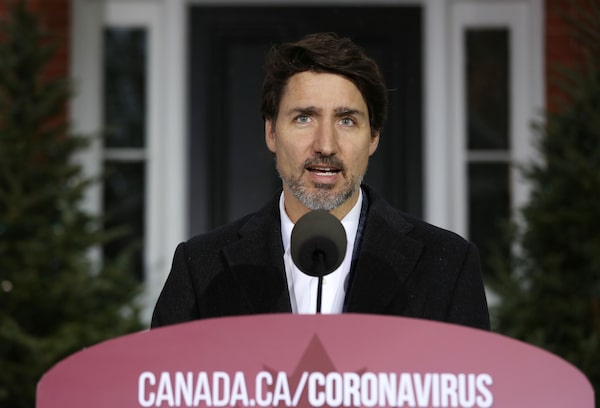
The close co-operation between the government of Justin Trudeau, seen here on March 29, 2020, and Doug Ford’s Progressive Conservative Ontario government is wondrous to behold.DAVE CHAN/AFP/Getty Images
In the space of a few long weeks, Canada has shifted from business-as-usual to a wartime economy, with the federal and provincial governments shutting down businesses and taking over direct control of many people’s wages, even as deficits head for levels not seen since the Second World War.
But here’s the good news: The debt that governments are piling on should be manageable, provided the new normal reverts to the old normal in a matter of months rather than years.
There will be bills to pay. But we should be able to pay them without sacrificing the quality of life of future generations.
That isn’t to understate the magnitude of what’s happened. The past few weeks roughly correspond to 1940, when Canada shifted suddenly from a peacetime economy trying to drag itself out of the Great Depression to a mobilizing wartime economy, with massive increases in government spending and government control.
“Our projected deficit this year, as a proportion of the size of government, will be roughly the same as the first full year of the war effort,” Drew Fagan, a professor at University of Toronto’s Munk School of Global Affairs and Public Policy and a former Ontario deputy minister, said in an interview. He has written a paper for the Munk Centre comparing the pandemic to the war
Then, as now, Ottawa massively increased spending as part of the war effort. The difference, we all hope, is that the Second World War lasted for six years, from Germany’s invasion of Poland in September, 1939, to Japan’s surrender in August, 1945.
Coronavirus guide: Updates and essential resources about the COVID-19 pandemic
‘Can I take my kids to the park?’ And more coronavirus questions answered by André Picard
Yet despite the massive deficits and debts that financed the war, Ottawa was back to running surpluses within two years of its end. “One might hope for something of the same turnaround,” Prof. Fagan said.
A surge in economic activity once governments release us from this national quasi-quarantine should also bring revenues up and deficits quickly down, though Prof. Fagan added that the federal government would need to continue spending as the economy transitioned back to normal.
That doesn’t change the fact that by the time this is all over “we will be looking at hundreds of billions of dollars in debt that we did not anticipate six weeks ago,” said Kevin Milligan, a professor of economics at University of British Columbia.
The good news is that federal and provincial governments are taking on this unexpected debt “at a time when we have some of the lowest interest rates we have ever seen,” said Douglas Porter, chief economist of the Bank of Montreal.
It costs only about a billion dollars to service $100-billion in debt. “That’s not a trivial amount, but it’s affordable,” Mr. Porter said.
And this economic shock has forced us all to confront realities that we were trying to avoid: One way or another, maybe sooner or maybe later, the Canadian economy needs to transition away from oil and gas to cleaner forms of energy, especially with oil prices so low it’s hard to make a living off them.
And as many have already pointed out, our aging society was going to force up the cost of health care, even before the pandemic arrived.
The difficult but essential task will be to sustain the economy as it recovers after the pandemic, while also bringing public-sector spending under control. Prof. Milligan fully supports the government’s emergency spending measures, such as the Canada Emergency Response Benefit and the Canada Emergency Wage Benefit.
But “the 'E’ part is the critical part to me," he said. "We cannot be paying $2,000 a month to anyone who checks a box forever.”
The best outcome would be a gradual ramping down of government spending and deficits as business and industries ramp up and life returns to normal.
We will also see the return of politics. Right now, opposing political parties are limiting their criticism of each other as governments struggle to respond to the greatest national emergency since the war. The close co-operation between the Justin Trudeau’s Liberal federal government and Doug Ford’s Progressive Conservative Ontario government is wondrous to behold.
But the day will come when politicians go back to wrangling over deficits and spending that are a tiny fraction of what we’re seeing now.
What a blessed day that will be.
Christopher Mio and Meghan Hoople found themselves jobless and wanting to help in the wake of COVID-19 isolation in Toronto. After flyering their neighbourhood with a free-of-charge offer, they received an outpouring of support and requests from people in need.
The Globe and Mail
Sign up for the Coronavirus Update newsletter to read the day’s essential coronavirus news, features and explainers written by Globe reporters.
 John Ibbitson
John Ibbitson